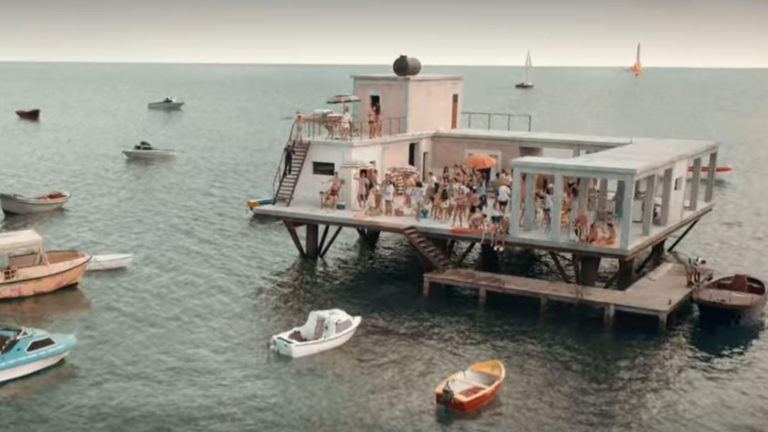One of the most libertarian movies ever created is now available on Netflix: Rose Island (original title in Italian: L’incredibile storia dell’Isola delle Rose or “The Incredible Story of the Island of Roses”). Directed by Sydney Sibilia in 2020, this Italian comedy-drama film tells the story of Giorgio Rosa, a young engineer, and his daring attempt at seasteading. Seasteading has been an ongoing dream of libertarians; Giorgio Rosa was a pioneer at seeking freedom in international waters, and few libertarians are aware of his imaginative and courageous attempt at it.
The movie kicks off with a young Giorgio Rosa (played by Roman actor Elio Germano) celebrating his graduation from engineering school in the city of Bologna, Italy in 1968. He then drives his love interest Gabriella (played by Matilda De Angeli) in his thesis project: a car he created himself, only to be ticketed and arrested for not having a license plate. Fed up with government regulations such as the one that landed him in jail, Giorgio reaches out to his best friend Maurizio about creating an island 6.8 nautical miles off the coast from Italy where it would lie outside of the Italian government-controlled territorial waters. Maurizio, fed up with working for his father, jumps at the proposition.
Most libertarians will be familiar with the Principality of Sealand, an unrecognized micronation off the coast of Britain. Originally it was called HM Fort Roughs, which was a World War II British military installation located 6.5 miles off of the British mainland. In 1967, having been abandoned for decades, it was occupied by an eccentric family who declared it to be an independent nation, issuing passports, stamps, coins, etc. In the 1960s, territorial waters only extended 6 miles off the coast of any nation, which is why both Sealand and Rose Island were located beyond the 6-mile mark. In 1987, an international treaty extended territorial waters to 12 miles off the coast of all nations. The big difference between Sealand and Rose Island was that the former is located in an already-existing structure and it is basically tolerated by the British government, whereas Rose Island was built from scratch thanks to the funding and technical knowhow of Giorgio Rosa.
The movie goes on to show how a German club promoter called Rudy (played by Tom Wlaschiha, who will be familiar to Game of Thrones fans having played Jaqen H’ghar), whose citizenship had been revoked on account of desertion and he was thus rendered stateless, is issued a Rose Island passport. Rudy helps turn Rose Island into a popular destination for club-goers sailing from the coastal Italian city of Rimini on the Adriatic Sea. In the movie, the Italian government decides to get involved once Giorgio starts seeking formal state recognition for Rose Island from the Council of Europe in Strasbourg and later the UN. In reality, the Italian authorities got word of the island’s untaxed profits from sales at Rose Island’s restaurant, bar, nightclub, souvenir shop, and post office, which was enough for the government to send the carabinieri (Italy’s national gendarmerie) and the Guardia di Finanza (financial crime police) to shut down these operations. In 1969, the Italian navy blew up the islands to pieces, and the real Giorgio Rosa claimed his dog died in the explosion.
The movie has some very funny moments as well as touching and poignant ones as well. It is well scripted, well directed, and the beautiful shots of Rimini and the Adriatic in general provide for a gorgeous backdrop. Both the movie and the real story of Rose Island will warm the hearts of libertarians and hopefully inspire future seasteaders out there. The movie doesn’t have a happy ending, but it does show the values of courage and the struggle for dignity in standing up against big government. In the annals of history of libertarianism, Giorgio Rosa and his island will forever be remembered as a beautiful affront to tyranny and control.














Add comment